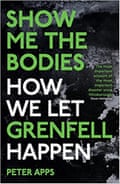A “magnificent” and “forensic” account of the policy decisions leading up to the Grenfell Tower fire, Show Me the Bodies: How We Let Grenfell Happen by Peter Apps, has won the 2023 Orwell prize for political writing. Meanwhile, Tom Crewe won the prize for political fiction with his historical novel The New Life, which dramatises the struggle to change Britain’s laws related to homosexuality in the 1890s.
The prizes aim to reward works that meet Orwell’s ambition “to make political writing into an art”. The winning books, which are both debuts, were announced during a ceremony at Conway Hall, London, on Thursday. Each author will receive £3,000.
The judging panel of the nonfiction prize, chaired by businesswoman Martha Lane Fox, said Show Me the Bodies, which blends a minute-by-minute narration of the 2017 fire with a decades-long history of building deregulation, “has the values of the Orwell prize at its core: it is beautiful writing about a devastating subject that we should all understand”.
The fiction judging panel, chaired by writer Boyd Tonkin, said The New Life’s characters – based on Havelock Ellis and John Addington Symonds, who wrote a pioneering book on homosexuality in the aftermath of the trials of Oscar Wilde – “are brought to vivid life by Crewe, who writes about their social, intellectual and erotic lives with extraordinary verisimilitude”.
Crewe is a contributing editor at the London Review of Books. In a recent interview, he said that he wrote The New Life in order to explore an underappreciated “hinge moment when at the beginning of the 1890s you had all this excitement and optimism about what we would now call gay rights”.
The judges said that “Crewe stays brilliantly faithful to the language, the outlook and the conventions of 1890s London even as he shows, and investigates, the distance between then and now”.
Apps, who lives in London, is a journalist and deputy editor at Inside Housing. Just over a month before the Grenfell fire killed 72 people, he broke a story on the dangers of combustible cladding, and has since followed Grenfell’s public inquiry, which ended in November 2022. The inquiry’s final report has not yet been published.
The judges called Apps’ book a “magnificent” work that “deftly combines vivid, compelling accounts of the victims of the fire with forensic (but no less engaging) detail on the decades of politics and policy which led up to it”.
after newsletter promotion

In his Observer review of Apps’ winning book, Rowan Moore wrote: “Never before, in years of reviewing books about buildings, has one brought me to tears. This one did, with the story of a Grenfell resident struggling to escape with his young daughters and heavily pregnant wife.”
Lane Fox’s fellow judges for the nonfiction award were head of climate and health policy at the Wellcome Trust Alice Bell; lecturer and writer Kojo Koram; journalist Cristina Odone and writer Sukhdev Sandhu.
Joining Tonkin on the fiction judging panel were New Scientist comment and culture editor Alison Flood, UCL professor of English Julia Jordan and New Statesman contributing editor Tomiwa Owolade.
Gary Younge won the journalism prize for pieces including Lest We Remember: How Britain its History of Slavery for the Guardian as part of its Cotton Capital series.
Two reporters from the Observer shared the Orwell prize for exposing Britain’s social evils. Mark Townsend won for his investigation revealing that dozens of asylum-seeking children staying at hotels run by the Home Office had been kidnapped by criminal gangs, while Shanti Das won for her investigation into exploitation of immigrant workers in the UK care system.
Steve Bloomfield, the Observer’s head of news, said: “Both Shanti and Mark spent many months on incredibly difficult and groundbreaking stories that exposed wrongdoings that would otherwise have remained buried. The Observer is extremely proud of the prize that reflects the results of that hard work.”
The Orwell prize was established in 1994. Nonfiction and fiction writing was initially judged together, but in 2019 the categories were separated. Previous winners of the prizes include Ali Smith, Patrick Radden Keefe, Colson Whitehead and Claire Keegan, who won the fiction prize in 2022.

